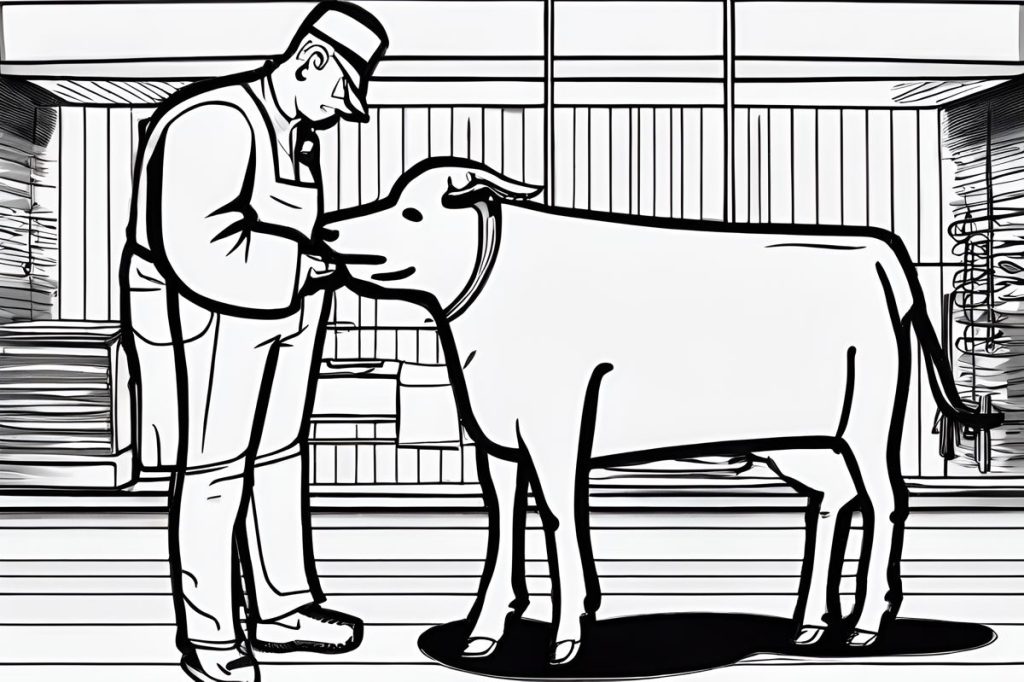In response to price controls on meat, northern butchers have devised a creative solution by implementing a “service fee” of 10-15% to maintain their income levels. This workaround showcases the challenges of enforcing governmental price caps and the innovative strategies businesses employ to sustain their livelihoods amidst economic regulations.
What is the reaction of northern butchers to price controls on meat?
Northern butchers, facing stringent price controls, have started charging a “service fee” of about 10-15% of the meat’s retail cost as a workaround to maintain income levels. This innovative approach highlights the challenges in enforcing governmental price caps and the creative solutions businesses devise to sustain their livelihoods.
Service Fee Introduction
In a bold move to navigate around stringent price controls, butchers in the north have begun charging an additional “service fee.” The north’s authorities recently mandated that the retail price of lamb meat should not exceed 500TL (€15.89) per kilogram. This decision was aimed at regulating the market and assisting consumers, but it appears to have had unintended consequences. Local butchers, whose livelihoods depend on meat sales, have opted for this innovative approach in order to maintain their income levels.
The “service fee” phenomenon has quickly become a topic of conversation among citizens. Reports from Saturday eyewitnesses suggest that these fees are varying, but they hover around 10 to 15 percent of the meat’s retail cost. While this strategy is clearly a workaround for the price cap, it raises questions about the effectiveness and enforceability of such governmental controls.
Political Perspectives
Tufan Erhurman, the leader of the opposition political party CTP, has spoken out on the matter. He criticized the use of price controls as a “risky legal instrument.” Erhurman argued that such measures should only be implemented after comprehensive reviews and consensus among all stakeholders. His concern is that without thorough preparation and universal adherence, these controls could undermine consumer confidence in both the market and the state’s authority.
Erhurman also warned of potential economic consequences, like the acceleration of a “southward shift” in the economy. With increasing numbers of Turkish Cypriots purchasing meat in the Republic, where prices are typically lower, local businesses are facing an existential threat. This pattern also raises concerns about food smuggling, which further complicates the economic landscape.
The Butchers’ Plight
Butchers in the northern region are caught in a tough spot. Rising costs and a dwindling customer base are squeezing their profit margins. Earlier this year, they made headlines by slaughtering two lambs in a dramatic protest. Their demands were clear: they wanted solutions that would align meat prices with those in the Republic, thereby preventing the disposal of unsellable and perishable goods.
This is not the first time the northern ‘government’ has tried to enforce price limitations. A similar situation unfolded with a decree on bread prices. Bakers collectively resisted, claiming the decree violated competition laws. They argued that each bakery determined its pricing based on individual costs and market conditions. Such resistance suggests that while the intent behind price controls may be to protect consumers, achieving compliance across different sectors presents a challenge.
Cross-Border Impacts and Legalities
Cross-border trade has also been affected, as evidenced by the seizure of almost two metric tonnes of beef in the Kyrenia district. Incidents of meat smuggling have increased, with fines levied against individuals caught transporting significant quantities of red meat across borders. These activities not only reflect the economic disparities between the north and south but also highlight the complexities of enforcing trade regulations in a divided region.
The northern ‘government’s’ attempts to reduce retail meat prices through direct intervention have sent a clear signal: while intended to provide relief, the measures are not meeting the expectations of local butchers. The service fee may be a clever loophole for now, but it speaks volumes about the challenges of governing a market economy, especially one as volatile and sensitive as the food industry.
How are northern butchers responding to price controls on meat?
Northern butchers have implemented a “service fee” of 10-15% on the retail cost of meat to maintain their income levels in response to stringent price controls. This creative solution showcases the challenges faced by businesses in enforcing governmental price caps.
What is the purpose of the “service fee” introduced by northern butchers?
The introduction of a “service fee” by northern butchers is a workaround to navigate around price controls mandated by authorities. This fee, which is around 10-15% of the meat’s retail cost, allows butchers to maintain their income levels amidst economic regulations.
How have political figures in the north reacted to the implementation of price controls on meat?
Political figures, such as Tufan Erhurman, leader of the opposition party CTP, have criticized the use of price controls as a risky legal instrument. Erhurman argues that thorough preparation and consensus among stakeholders are necessary for effective implementation. He also warns of potential economic consequences, such as a “southward shift” in the economy.
What are the cross-border impacts and legalities associated with the implementation of price controls on meat in the north?
The implementation of price controls on meat in the north has affected cross-border trade, leading to incidents of meat smuggling and fines against individuals caught transporting significant quantities of red meat across borders. These activities highlight the economic disparities between the north and south and the complexities of enforcing trade regulations in a divided region.

